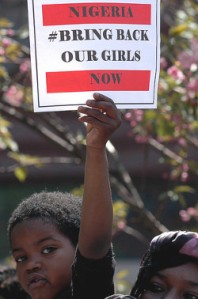Paul Jackson is a political economist working predominantly on conflict and post-conflict reconstruction. Core areas of interest include decentralisation and governance, conflict analysis, and security sector reform.
Amongst the violent international groups vying for our attention, Boko Haram in Nigeria has been one of the most persistent. Boko Haram declared an Islamic caliphate in Gwoza, along the Cameroon border, in August 2014, and the group has been raiding several cities across the north.
The group promotes a version of Islam which makes it ‘haram’ (forbidden) for Muslims to take part in any political or social activity associated with Western society and frequently attacks schools and colleges, which it sees as ‘westernisation’. In October alone around 185 churches have been torched in Borno and Adawama states, and seven civilians were beheaded in Ngambu.
The core of the insurgency covers Borno, Yobe, and Adamawa states, and they have been under a state of emergency since May 2013. Founded in 2002 by a cleric who believed the earth was round, the group has killed more than 5000 civilians, with Human Rights Watch estimating that at least 2,053 civilians have been killed since the beginning of 2014.
People gathered in New York City on May 3, 2014, to demand the release of schoolgirls abducted by Boko Haram insurgents in Nigeria. Photo credit: Michael Fleshman
Boko Haram gained worldwide infamy after it kidnapped 220 schoolgirls in Chibok, Borno State in April 2014.
Given the sorry record of the Nigerian state in locating the girls, and the inability of the Nigerian military to fight the insurgency, it is therefore welcome that last week the Nigerian Government announced a ceasefire with Boko Haram that included the potential release of these girls.
Discussions held between Air Chief Marshall Alex Badeh, the Chief of Defence Staff, and a fighter called Danladi Ahmadu, who identified himself as the ‘Secretary-General’ of Boko Haram, have been held in N’Djamena in Chad. The Nigerian government claims it has agreed a ceasefire with the group Boko Haram and is negotiating the release of more than 200 schoolgirls. Boko Haram negotiators assured the Government that the schoolgirls and all other people in their captivity are all alive and well, controversially contradicting the evidence of four escaped girls who claimed they had been raped every day.
However, this deal raised as many questions as it answers. For a start, this is not the first such announcement by the Government. An earlier deal for 19 Boko Haram commanders stalled and the Government refuses to say what the price for this deal is. A similar deal between the Cameroon Government and Boko Haram last week saw the release of ten Chinese workers and the wife of the Vice–president amongst 27 others, in return for around US$400,000. We await details of this deal, which are to be announced later this week.
There have also been questions raised about Ahmadu, said to be Boko Haram’s representative at the talks and who gave a radio interview broadcast on Friday morning. Many Nigerian analysts cast doubt on Ahmadu’s credibility as a Boko Haram envoy, and question his relationship with the group’s leader, Abubakar Shekau.
At the same time, no-one really understands the internal command structure of Boko Haram and so determining who is responsible for negotiating and on behalf of whom is difficult. Such groups are usually loose federations of different groups, and it is not clear if Ahmadu represents the group as a whole or a faction.
The timing of the agreement is also interesting, raising suspicions given that the Nigerian president, Goodluck Jonathan, is expected to declare his re-election bid, and positive news about the hostages and insurgency could give him a significant political boost. This also comes on the heels of local speculation about close links between some Boko Haram groups and Nigerian politicians. The factionalism argument was also given some credibility since on the same day as the ceasefire, more than 1000 fighters were reported as arrested in Lagos with the aid of local Arewa chiefs.
Continuing violence following the ceasefire where suspected militants killed dozens of people in five attacks on Nigerian villages, has led the Government to label these groups ‘criminals’ taking advantage of the chaos in the north, but they could be part of an ongoing violent convulsion of which Boko Haram is one part and not the whole story.
Boko Haram has grown in to such an amorphous entity that it is difficult to know exactly who is representing whom. This has important implications for both Nigeria and also regionally.
The insurgency has not only affected Nigeria but large parts of the border with Cameroon, where around 400,000 Nigeria refugees have moved across the border followed by the same style of violence. It is likely that Cameroon will become a major area of Boko Haram militancy in the next few months.
Aside from this, the inability of the Nigerian military and the reported demoralisation of Nigerian troops claiming poor equipment and training and unreliable pay, has led to a reduced faith in the security services, bolstered by a general belief across Nigeria that many politicians are somehow involved with either Boko Haram directly, or in undermining the military.
An inability of the state to project meaningful power has effectively lost a large area of the north, where Boko Haram freely controls territory and declared a Caliphate. It is notable that the only announcement the Government made under the ceasefire was that no territory was being handed over. However, the fact that the Government has negotiated and in effect recognised Boko Haram – and indeed differentiated them from criminal elements – has given the group valuable recognition and with it, credibility.

